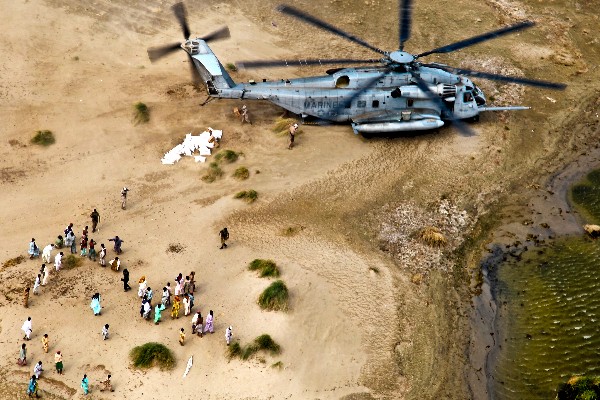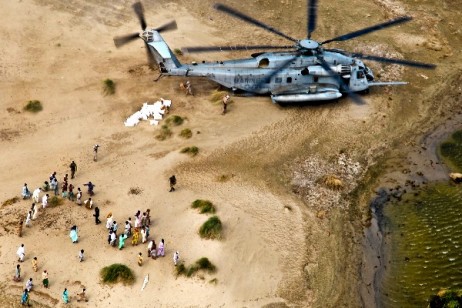
Linking Climate Change and Conflict – New Report Stirs Old Debate
 Today, we have a new entrant into the academic debate about the link between climate change and conflict. This is a well-trodden path, but the comprehensiveness of this new paper seems to indicate a direct and clear link between interpersonal violence and spikes in temperature. A new study out in Science (stupid paywall means I haven’t actually read it yet – only the news reports about it) comprehensively analyzes 60 previous studies to find a definite link between climate change and human conflict. As Ker Than in National Geographic writes “even relatively minor departures from normal temperatures or rainfall amounts substantially increased the risk of conflict on a variety of levels, ranging from individual aggression, such as murder and rape, to country-level political instability and international wars.” The study has received broad coverage, including from CNN, Scientific American, RTCC, Christian Science Monitor, and more.
Today, we have a new entrant into the academic debate about the link between climate change and conflict. This is a well-trodden path, but the comprehensiveness of this new paper seems to indicate a direct and clear link between interpersonal violence and spikes in temperature. A new study out in Science (stupid paywall means I haven’t actually read it yet – only the news reports about it) comprehensively analyzes 60 previous studies to find a definite link between climate change and human conflict. As Ker Than in National Geographic writes “even relatively minor departures from normal temperatures or rainfall amounts substantially increased the risk of conflict on a variety of levels, ranging from individual aggression, such as murder and rape, to country-level political instability and international wars.” The study has received broad coverage, including from CNN, Scientific American, RTCC, Christian Science Monitor, and more.
However, there has been some significant opposition to the link between climate change and conflict, with researchers like Clionadh Raleigh, Nils Petter Gleditsch, and Neil Adger advocating for caution in finding the link, Halvard Buhaug found no link between climate and conflict in Africa. On the other hand, Marshall Burke has found the exact opposite, saying that warming increases the risk on civil war in Africa. The debate has gotten so heated that Andrew Solow wrote in May “A Call for Peace on Climate and Conflict” in Nature. Geoff Dabelko, has cautioned that we have to avoid hyperbole and oversimplification on the link between climate and conflict. My old colleague Jeff Mazo wrote a great book “Climate Conflict” puzzling out all these competing debates. When the IPCC releases their much-anticipated 5th Assessment Report later this year, they will include a chapter on Human Security, written in part by Geoff; I’m hoping there will be more clarity after that.
Much of my work at ASP focuses on how climate change is a threat to national security – and frankly, I find the debate to be exhausting. For national security planners and professionals, we don’t need a scientific consensus directly linking past changes in climate or temperature to violent conflict. When national security planners look at threats to our security, they know that you cannot act with certainty: once you have 100% certainty, it is too late to act. The truth is that so long as there’s a persuasive chance that climate change will cause conflict, prudent actions to mitigate that threat are in order. I’ve written before about Dick Cheney’s “1% doctrine” which stated about weapons of mass destruction: “Even if there’s just a 1 percent chance of the unimaginable coming due, act as if it is a certainty.”
We have more than enough knowledge to know that climate change is potentially dangerous – we know that 97% of scientists agree with the basic tenets of the science: the climate is warming, and that warming is caused by man-made greenhouse gas emissions.
As I wrote (with Catherine Foley) in last year’s “Climate Security Report“:
Academic researchers have been debating the links between climate change and conflict for decades. The academic consensus is that climate change alone is unlikely to be a primary cause of conflict, but it is an important secondary cause.
A changing climate will increase vulnerability by exacerbating tensions related to water scarcity and food shortages, natural resource competition, underdevelopment and overpopulation. It acts as an accelerant of instability,which may lead to violence.These disruptions will burden civilian and military institutions around the world, including the U.S. military.”
In the end, this academic debate has largely been overtaken by events. Militaries and governments around the world overwhelmingly do see climate change as a threat to their national security. ASP’s Global Security Defense Index on Climate Change shows that more than 70% of the countries in the world see it as a threat to their security. In forthcoming research from the Index, we will show that the militaries of more than 70 countries have definite plans for how to deal with the threat of climate change. I say, let the academics continue to puzzle out the direct or indirect causal links between climate change and conflict. We don’t need a complicated cross-sectional regression equation to show that climate change presents risks. The risks of climate change are more than clear enough to demand action: its time to get to work.






[…] Linking Climate Change and Conflict – New Report Stirs Old Debate Andrew Holland Today, we have a new entrant into the academic debate about the link between climate change and conflict. This is a well-trodden path, but the comprehensiveness of this new paper seems to indicate a direct and clear link between interpersonal violence and spikes in temperature. […]
[…] However this particular study is judged in the future, it has certainly added to a growing evidence base, and policy-makers should take note. If there is a possibility that the risk of conflict increases due to climatic change, as a society we need to at least be prepared to deal with it. That is how risk managers (see “Degrees of Risk”), and military planners (see the U.S. Department of Defense’s 2010 “Quadrennial Defense Review” and ASP’s “Global Security Defense Index“), responsibly approach such issues already. A debate that generally ignores the data, and a risk analysis framework, in favor of media-driven memes, can be disastrous for the development of sound policy – particularly in terms of policies addressing national and international security. As Andrew Holland at the American Security Project compellingly argues: […]
[…] Holland also has a good post putting the study in the broader context of the sometimes contentious debate over the link between […]
[…] To read Andrew Holland’s blog, click here. […]
[…] Linking climate change and conflict- new report stirs old debate […]
[…] Andrew Holland of the American Security Project takes note of the contested debate among scholars, but finds it “exhausting.” He […]
[…] Holland also has a good post putting the study in the broader context of the sometimes contentious debate over the link between […]
[…] climate change as a “threat multiplier” that could, in combination with other factors, exacerbate international instability and contribute to armed conflict. But he cautions against attributing individual events—be […]
[…] climate change as a “threat multiplier” that could, in combination with other factors, exacerbate international instability and contribute to armed conflict. But he cautions against attributing individual events—be they […]
[…] is more of the mindset that changing temperatures will not impact individual crimes, but instead ‘exacerbates international instability‘ and ‘contributes to armed […]
[…] climate change as a “threat multiplier” that could, in combination with other factors, exacerbate international instability and contribute to armed conflict. But he cautions against attributing individual events—be they […]
[…] climate change as a “threat multiplier” that could, in combination with other factors, exacerbate international instability and contribute to armed conflict. But he cautions against attributing individual events—be […]
[…] sees climate change as a “threat multiplier” that could, in combination with other factors, exacerbate international instability and contribute to armed conflict. But he cautions against attributing individual events—be they […]